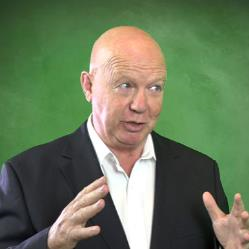
"Training is only one component of a skills development jigsaw." - Discussion with John Smibert.
Tony Bonanno is a leading sales trainer and yet I heard him say "training doesn't work". I wondered if he was trying to destroy his business? So I asked him why he said that.
 Tony clarified that "training in the conventional sense doesn't work". He explained that conventional sales training meant salespeople were brought together for training and then sent back to the field - and that was it, job done!
Tony clarified that "training in the conventional sense doesn't work". He explained that conventional sales training meant salespeople were brought together for training and then sent back to the field - and that was it, job done!
Unfortunately it didn't work - the participants in the training would forget most of what they learnt over the following weeks. Tony quoted CEB research that found that participants retained less than 5% of items taught after a week back in the field, unless they applied what they learnt.
Why? Well Tony listed a number of reasons including; the training was not pitched at their level, it was not applicable to their current needs, they were not able to apply what they learnt on return to their territory, there was no monitoring or coaching in the field relative to what they learnt.
Tony went on to say "the essence for make training work is that we apply a process of consolidation that allows people to learn what they need, to apply it very quickly, to be measured and monitored, to ensure we get them in the frame of mind where they start using what they've learned as quickly as possible.
Tony outlined a 3 step process for ensuring this is achieved
See the interview below to learn the 3 steps on how to plan and execute the effective development of salespeople.
Tony Bonnano is a thought leader in sales management, sales growth and behavioural change
See more of the 'TALKING SALES' series here
Interview
John: Hello, I'm with Tony Bonanno again - welcome back, Tony!
Tony: Thank you, John!
John: Hey Tony, I want to hold you accountable for something. [laughs]
Tony: By all means, please do!
John: You run a training organisation, and you've been involved in training salespeople and sales managers for a lot of years, and yet you're on public record of standing up and saying, "Training doesn't work."
Tony: And I'm going to stay on public record, John - absolutely.
John: Tell me what you mean!
Tony: Training in the conventional sense doesn't work. Most people still go to training events that have been organised for them, they might last half a day, a day, a week if they happen to be on something fairly serious; there's an agenda, there's a curriculum, they go, they're expected to learn. And then what happens? They get back to their workplace, and they get busy doing what they weren't doing when they were training.
John: And ultimately only 5, 10 or 15 percent of what they learned in the training course is retained, the rest is just forgotten forever.
Tony: Some of the statistics that I've read recently from Corporate Executive Board showed that after a week less than 5% retention of items learned, unless they have been applied.
John: That's a shocking ROI when you think about it, isn't it?
Tony: That's pretty dreadful. So, the essence is in order to make training work we have to have a process of consolidation that allows people to apply very quickly, to be measured, monitored, and to get them in the frame of mind where they start using what they've learned as quickly as possible.
John: Okay, so what you're saying is that the training's okay but you need to have a development process and methodology that training's only just part of.
Tony: It's one of three key elements.
John: What are those three?
Tony: The first element is a training person should conduct a really thorough diagnostic to understand two things, the factors that are inhibiting performance, and then secondly the causes of those factors.
John: And done that before running the training course.
Tony: Before you run the training course. Then you put together a training programme that addresses the causes, not just the factors themselves but digging down until you strike oil finding the cause, and putting something around... a mind shift development around there.
John: And the third item?
Tony: The third item is that process of consolidation, which should include the management layer that's involved in that process, so that they can take over the process of working with people to bed down those new skills or habits or processes that they're going through.
John: I'm glad you say that, the sales management need to be very heavily involved in that development programme. They've got the responsibility of actually coaching what the salespeople learnt, and monitoring and coaching and facilitating and the ongoing learning of what was put together.
Tony: They're the ones ultimately who are accountable for the outcome, so they need to be involved.
John: The trainers have got some responsibility there too I assume; they need to put content together, they need to follow up and make sure the sales managers are doing what they need to be doing, surely.
Tony: It's a consultative process, it's a hand-holding process. In terms of the accountability it starts with that diagnostic; if you don't get the causes of the factors right, you're going to put the wrong content together.
John: Okay. To summarise then, when you say, "Training doesn't work," you mean training in the old sense of just going to a two-day training course and forgetting about it after that. You're meaning it's a whole development process of which training is one component.
Tony: The actual workshop, one component.
John: I absolutely agree with you. I think it's good learning, and anybody out there that's just running training courses, listen carefully. You'll find that the best way of thinking of this is a process, not a single training course. Thank you, Tony!
Tony: Pleasure, John!
****************
More interviews with Tony Bonanno:
***************

Your Invitation: I invite you to join the Sales Leader Forum group on LinkedIn where you can experience informative discussions with your peers and sales thought leaders on subjects like the one we have discussed here. I also invite you to subscribe to the
- Sales Leader Resource Centre here
- Sales Leader YouTube channel here (300+ sales leadership videos)
Please Share: If you valued this article, please share via your Twitter, LinkedIn, Google+ and Facebook social media platforms. I encourage you to join the conversation or ask questions. So feel free to add a comment on this post - I promise to respond. If inclined please follow my LinkedIn post page here.
Want to touch base? If you have questions please feel free to contact me - email: john.smibert(at)salesleaderforums.com, Phone: +61 404857893 or Skype: john.smibert